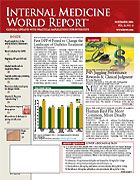Publication
Article
Internal Medicine World Report
Optimize Depression Therapy in Patients at Risk for Diabetes
Author(s):
From the American Association of Diabetes Educators Prediabetes Surprisingly Associated with Increased Levels of Depression
Los Angeles—Patients who have recently progressed from a high-risk cardiometabolic state to type 2 diabetes appear to have fewer depressive symptoms, which can make them more receptive to interventions that encourage self-management of their disease, survey results presented at the American Association of Diabetes Educators meeting indicate.
Patients with ≥3 risk factors for diabetes had higher levels of depression than they did after they progressed to type 2 diabetes.
The reason for this unexpected finding is unclear, but investigators speculated that some high-risk patients might be relieved to find that their symptoms have an identifiable and treatable cause.
“What this survey indicates is that possibly we have a very narrow window of time of diagnosis when the level of depression declines, and maybe we’ll be more successful at changing long-term behavior,” said Debbra Bazata, RD, a diabetes educator with St. Luke’s South Primary Care in Overland Park, Kan.
Depression increases a person’s risk of developing type 2 diabetes, and the prevalence of depression in patients with diabetes is higher than their nondiabetic counterparts.
However, little information was available on levels of depression in high-risk patients immediately before and just after they meet the criteria for diabetes.
The Study to Help Improve Early Evaluation and Management of Risk Factors Leading to Diabetes (SHIELD) examined depression in 11,088 persons with self-reported diabetes or risk factors for the condition, such as abdominal obesity, dyslipidemia, or hypertension. The study population was selected from returned questionnaires that were mailed to a random sample. Depression was assessed by a 9-item survey instrument. Participants completed the questionnaires at entry and again 1 year later.
Patients with ≤2 diabetes risk factors were classified as low risk; those with ≥3 risk factors were high risk. Survey respondents were categorized according to their risk transition over the course of the study (ie, low to high risk, high risk to type 2 diabetes, and high to low risk).
At baseline and at follow-up, high-risk patients and those with type 2 diabetes were more likely to have moderate or severe depression compared with those at low risk.
The odds for moderate depression was 31% greater in high-risk patients and 55% greater in patients with type 2 diabetes. Severe depression was 52% more likely in high-risk patients and 82% more likely in patients with type 2 diabetes.
The prevalence of major depression decreased from 11% at baseline to 7% at 12 months in patients who went from high risk to low risk for diabetes. Unexpectedly, among patients who progressed from high risk to type 2 diabetes, the prevalence of major depression also decreased from 11% to 7%.
In patients whose diabetes risk status did not change or who progressed from low risk to diabetes, little or no change was seen in depression prevalence.
These results show that the relationship between diabetes and depression is complex, said Ms Bazata. For example, being in a high-risk transition group had the strongest influence on the level of depression between baseline and 12 months. However, levels of depression were also more likely to decrease among high-risk transition groups during follow-up.
One potential implication of these findings is that diagnosis and treatment of depression in patients at high risk for diabetes might have a favorable impact on their receptivity and adherence to interventions aimed at improving diabetes self-management.
“There’s no question that patients who are depressed have more difficulty adhering to interventions,” said Ms Bazata. “Mental health is a big issue in a patient’s ability to make behavior change, and attention to that issue could be helpful.”






